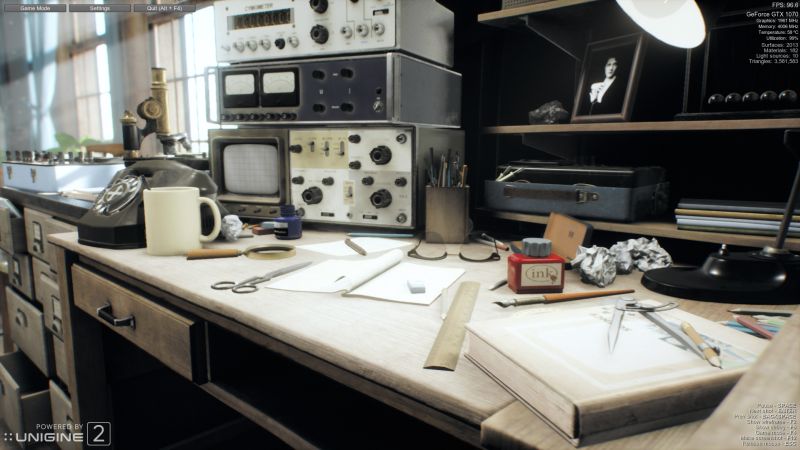
1 – Overview
Ecco fatto, the Unigine team has released their new graphics benchmark called Superposition. Superposition is a graphics benchmark tool for Windows and Linux and offers OpenGL (4.5?) and Direct3D (11/12?) graphics tests (I found weird that the version of Direct3D is no specified in Superposition website nor in the docs…). Vulkan is not available but is planned…
The main features of Superposition are:
– Top-notch visuals powered by UNIGINE 2 Engine
– Extreme hardware stability testing
– GPU temperature and clock monitoring
– Unique SSRTGI (Screen-Space Ray-Traced Global Illumination) dynamic lighting technology
– VR experience (Oculus Rift and HTC Vive)
– Free exploration mode with mini-games
– Over 900 interactive objects
– Global leaderboards integration
You can download Superposition from the homepage: Superposition Benchmark.
2 – Gallery
Before the test, here are some screenshots of the benchmark (high resolution screenshots are available HERE):
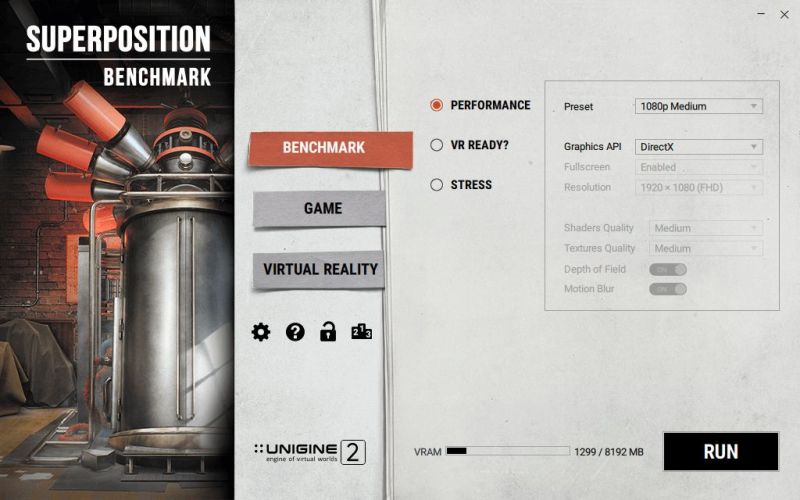

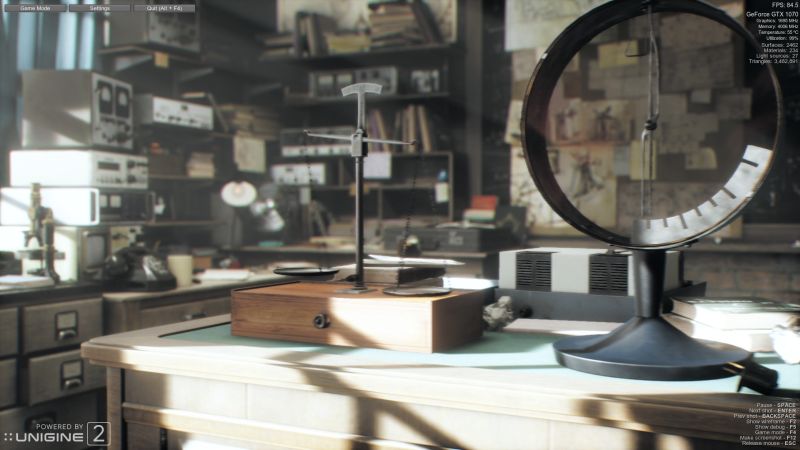
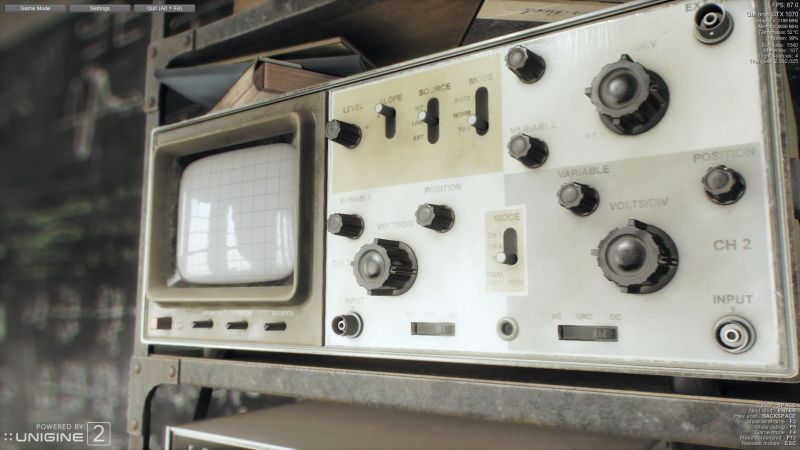
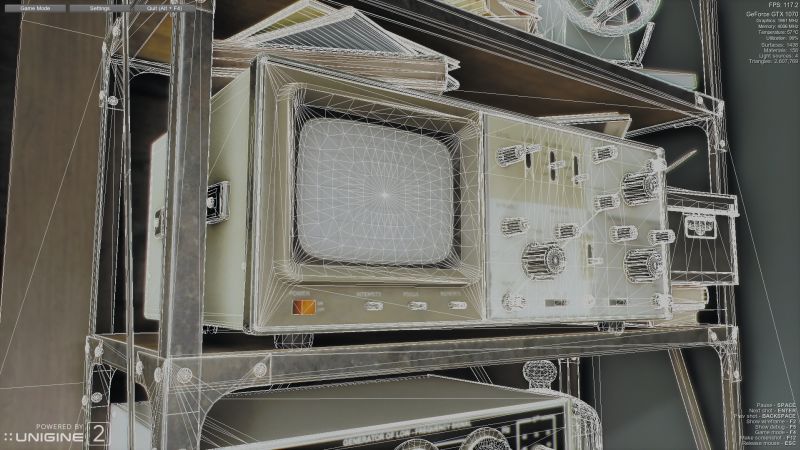
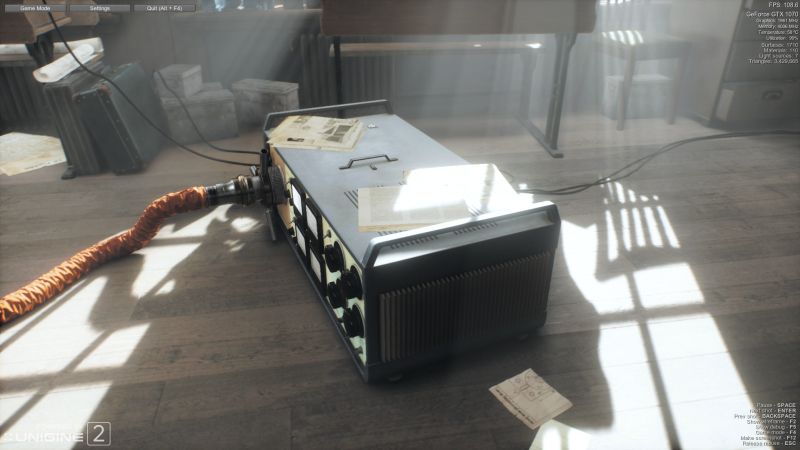
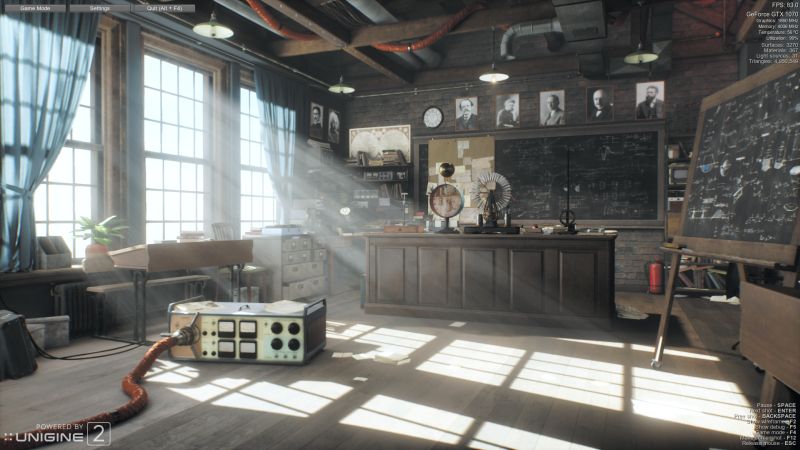
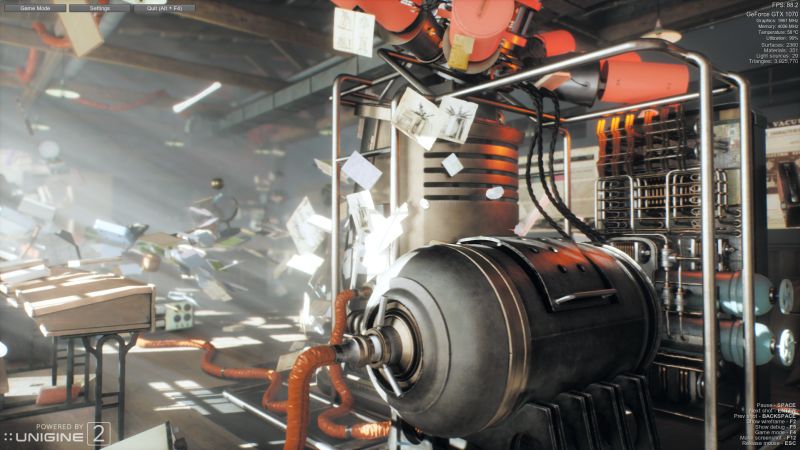
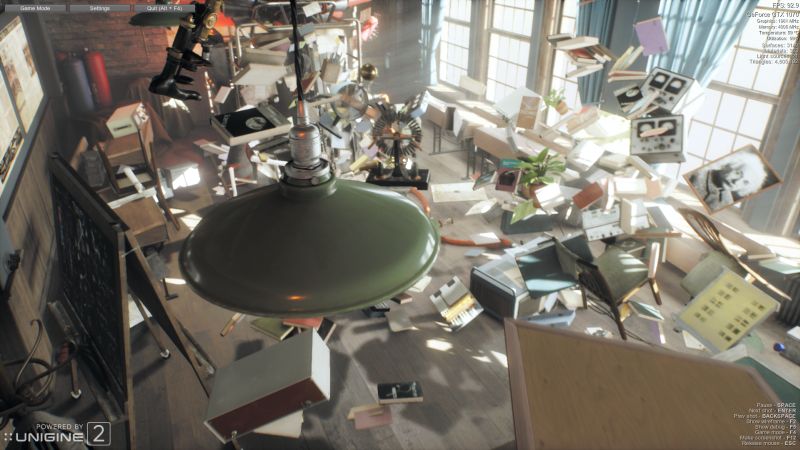
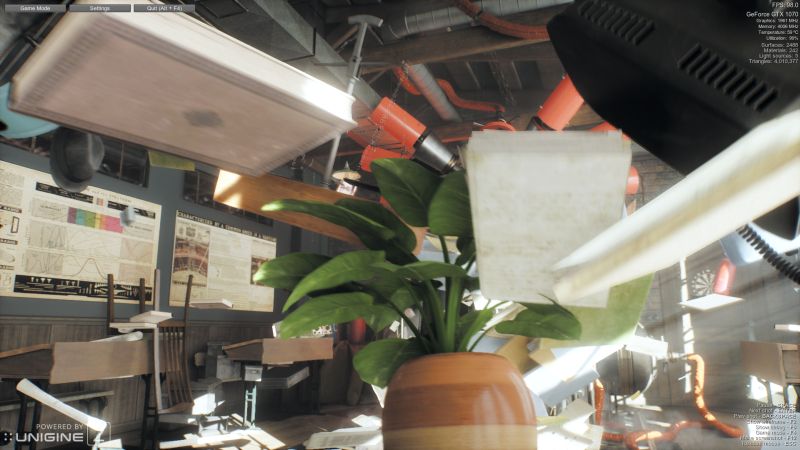
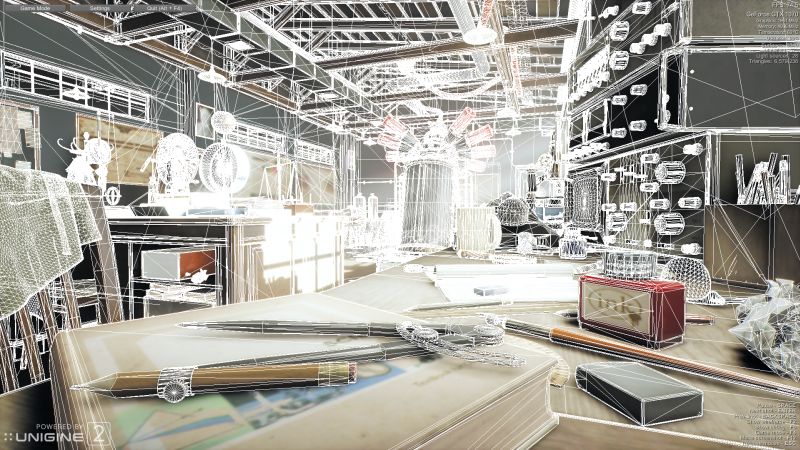
3 – Benchmark
Testbed:
– Intel Core i5 4670K @ 3.4GHz
– RAM: 16GB DDR3 @ 1600MHz
– GIGABYTE G1.Sniper M5
– Windows 10 64-bit
– NVIDIA R381.65 and AMD Crimson 17.3.2
I will update the comparative table later with other GPUs (benchmarking takes time!).
A thread for Superposition benchmark is available HERE.
3.1 – Settings 1080P Medium – Direct3D
| 16346 points (122.2FPS) – ASUS GTX 1080 Strix – R381.65 |
| 13080 points – EVGA GTX 1070 FTW – R381.65 |
| 7503 points (56.1FPS) – MSI GTX 970 – R381.65 |
| 7089 points – MSI Radeon RX 470 – C17.3.2 |
3.2 – Settings 1080P Medium – OpenGL
| 14007 points (104.7FPS) – ASUS GTX 1080 Strix – R381.65 |
| 11908 points – EVGA GTX 1070 FTW – R381.65 |
| 7036 points (52.6FPS) – MSI GTX 970 – R381.65 |
| 5572 points – MSI Radeon RX 470 – C17.3.2 |
3.3 – Settings 1080P Extreme – Direct3D
| 4251 points (31.8FPS) – ASUS GTX 1080 Strix – R381.65 |
| 3549 points – EVGA GTX 1070 FTW – R381.65 |
| 2170 points – MSI Radeon RX 470 – C17.3.2 |
| 2062 points (15.4FPS) – MSI GTX 970 – R381.65 |
3.4 – Settings 1080P Extreme – OpenGL
| 3453 points (25.8FPS) – ASUS GTX 1080 Strix – R381.65 |
| 3124 points – EVGA GTX 1070 FTW – R381.65 |
| 1841 points – MSI Radeon RX 470 – C17.3.2 |
| 1826 points (13.6FPS) – MSI GTX 970 – R381.65 |
3.5 – Settings 4K Optimized – Direct3D
| 6985 points (52.2FPS) – ASUS GTX 1080 Strix – R381.65 |
| 5605 points – EVGA GTX 1070 FTW – R381.65 |
| 2973 points – MSI Radeon RX 470 – C17.3.2 |
| 0 point – ***VRAM LIMITED*** – MSI GTX 970 – R381.65 |
3.4 – Settings 4K Optimized – OpenGL
| 6399 points (47FPS) – ASUS GTX 1080 Strix – R381.65 |
| 5158 points – EVGA GTX 1070 FTW – R381.65 |
| 2382 points – MSI Radeon RX 470 – C17.3.2 |
| 0 point – ***VRAM LIMITED*** – MSI GTX 970 – R381.65 |
Here are the screenshots of the result score box (Direct3D) for the GTX 1070:
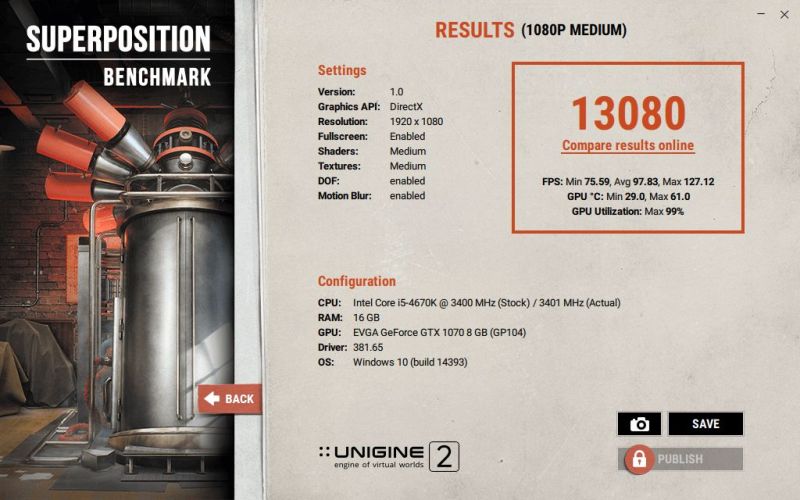
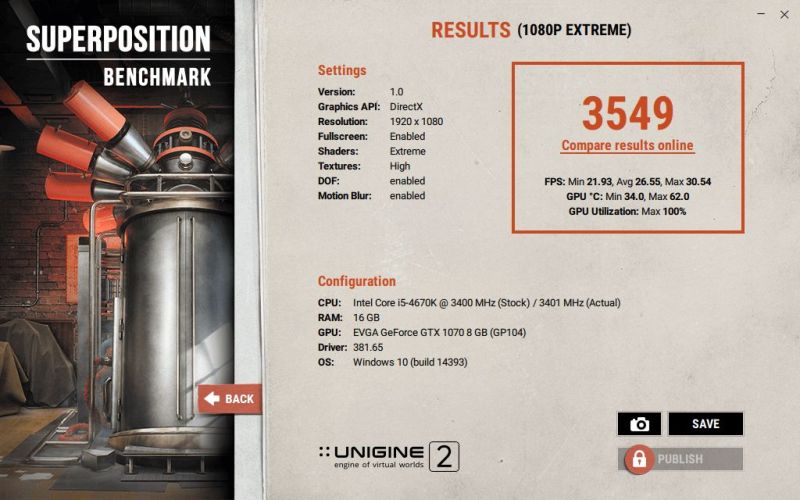
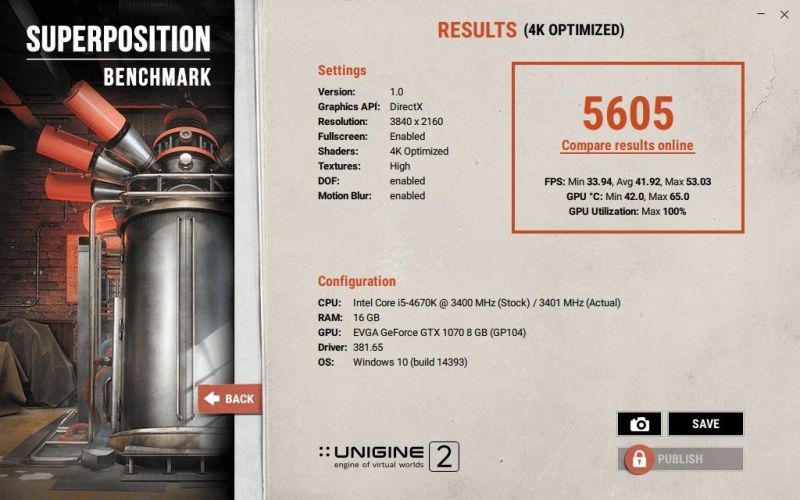
Perhaps you guys could let Unigine know their use of insecure SSL symbols in their compiled Qt stack hangs their massive benchmark indefinitely with Debian Linux who strips out outdated and insecure symbols of SSL from their Qt compiles.
Fun times;
mdriftmeyer@horus:~/Downloads/Unigine_Superposition-1.0$ ./Superposition
mdriftmeyer@horus:~/Downloads/Unigine_Superposition-1.0$ qt.network.ssl: QSslSocket: cannot resolve CRYPTO_num_locks
qt.network.ssl: QSslSocket: cannot resolve CRYPTO_set_id_callback
qt.network.ssl: QSslSocket: cannot resolve CRYPTO_set_locking_callback
qt.network.ssl: QSslSocket: cannot resolve ERR_free_strings
qt.network.ssl: QSslSocket: cannot resolve EVP_CIPHER_CTX_cleanup
qt.network.ssl: QSslSocket: cannot resolve EVP_CIPHER_CTX_init
qt.network.ssl: QSslSocket: cannot resolve sk_new_null
qt.network.ssl: QSslSocket: cannot resolve sk_push
qt.network.ssl: QSslSocket: cannot resolve sk_free
qt.network.ssl: QSslSocket: cannot resolve sk_num
qt.network.ssl: QSslSocket: cannot resolve sk_pop_free
qt.network.ssl: QSslSocket: cannot resolve sk_value
qt.network.ssl: QSslSocket: cannot resolve SSL_library_init
qt.network.ssl: QSslSocket: cannot resolve SSL_load_error_strings
qt.network.ssl: QSslSocket: cannot resolve SSL_get_ex_new_index
qt.network.ssl: QSslSocket: cannot resolve SSLv2_client_method
qt.network.ssl: QSslSocket: cannot resolve SSLv3_client_method
qt.network.ssl: QSslSocket: cannot resolve SSLv23_client_method
qt.network.ssl: QSslSocket: cannot resolve SSLv2_server_method
qt.network.ssl: QSslSocket: cannot resolve SSLv3_server_method
qt.network.ssl: QSslSocket: cannot resolve SSLv23_server_method
qt.network.ssl: QSslSocket: cannot resolve X509_STORE_CTX_get_chain
qt.network.ssl: QSslSocket: cannot resolve OPENSSL_add_all_algorithms_noconf
qt.network.ssl: QSslSocket: cannot resolve OPENSSL_add_all_algorithms_conf
qt.network.ssl: QSslSocket: cannot resolve SSLeay
qt.network.ssl: QSslSocket: cannot resolve SSLeay_version
qt.network.ssl: QSslSocket: cannot call unresolved function CRYPTO_num_locks
qt.network.ssl: QSslSocket: cannot call unresolved function CRYPTO_set_id_callback
qt.network.ssl: QSslSocket: cannot call unresolved function CRYPTO_set_locking_callback
qt.network.ssl: QSslSocket: cannot call unresolved function SSL_library_init
qt.network.ssl: QSslSocket: cannot call unresolved function SSLv23_client_method
qt.network.ssl: QSslSocket: cannot call unresolved function sk_num
mailto:superposition-support@unigine.com
Thanks, the Unigine team will probably see your feedback shortly…
Scores updated with the ASUS GTX 1080 Strix.
Scores updated with the MSI GTX 970.